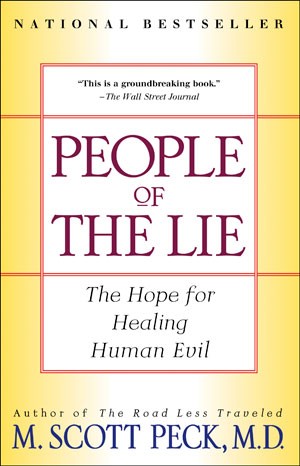One of the most powerful and disturbing books I ever read was People of the Lie by M. Scott Peck. While I say powerful and disturbing, I do not want to discourage you from reading it, rather the opposite.
I believe that most people will at some point in their lives encounter a truly evil person, if they have not already. For anyone who doubts the existence of evil, I urge you to read People of the Lie and see if that doubt still exists afterwards.
M. Scott Peck is the author of several books, perhaps the best known being The Road Less Travelled. That book was study of human spirituality and growth, whereas People of the Lie is a study of what could be considered the opposite of human growth: Human Evil.
The idea that human evil exists is difficult for many people to swallow. Most consider evil too archaic a concept to apply in our modern, scientific society. We want to reduce it to a medical diagnosis, or some personality disorder, or something that can be managed with a pill.
Not that this is surprising, we have a pill obsessed culture. We have pills for weight loss, sleep, happiness and even erections. If it isn’t quick fix, then we don’t want it.
But there’s no pill that can cure evil.
As a psychiatrist himself, Scott Peck does not discount the existence of various psychiatric disorders, including those that can cause people to behave in an evil way, but rather views evil as being a distinct problem that straddles the line between a personality disorder, and spiritual disorder, perhaps leaning towards the latter. He describes evil people as being aware of their conscience, but actively choosing to ignore it, as opposed to a sociopathic person who appears to be devoid of conscience altogether. In other words, an evil person knows that they are doing evil, while a sociopath does not, even though their actions may be very similar.
Peck describes evil as “militant ignorance”. Evil people are obsessed with maintaining their self-image of perfection through self-deception. In addition, evil people will be very selective about who they inflict their evil upon, while going to great lengths to maintain an image respectability and normality with everyone else. As a result, evil people are often well liked by the majority, and their victims come across as being overly sensitive, having a persecution complex, or even being crazy.
Evil people, unable to face the painful reality of their character, will often place themselves in positions of power, or moral superiority. A perfect pop culture example of this is the movie Lakeview Terrace.
In the movie, a young couple move into their dream home, only to be terrorized by their next door neighbour, a respected Los Angeles cop played by Samuel L Jackson. Jackson’s character objects to the couple being interracial, and embarks on a hate fuelled mission to ruin their lives. When the couple try to get help, no on believes them due to Jackson’s status in the community. What clearly demonstrates that Jackson’s character is evil and not simply mentally ill, is that not only does Jackson’s character not feel remorseful about his actions, but he is well aware of the fact that he is hurting people, and enjoys it.
My encounters with human evil
Peck considered human evil to be difficult to diagnose, and suggested that falsely labelling others as evil was evil itself. I am not sure if I agree with that. I feel that once one has been a victim of an evil person they are more than qualified to identify it in the future, especially if we accept Peck’s definition.
That is not to say I take such a determination lightly. I don’t. I have met my fair share of objectionable people in life, but only two that I would classify as evil. I am tempted to share the stories of these people in-depth, but after much consideration I have decided that some things are best not shared on the internet. Instead I will share some general facts about both people, who were shockingly similar in their behaviour.
The first was a woman who was heir to a sugar company. She was wealthy and well-respected within the community.
The second was a retired police officer, not unlike the character Samuel L. Jackson plays in Lakeview Terrace, in fact, he was alarmingly similar. He also was well-respected in some circles, due to his rank within the police force. In reality, he had been forced to retire in shame, and had faced eleven internal charges against him, and had made enemies of many people who he has abused over the years, but most people would never know this.
